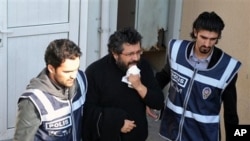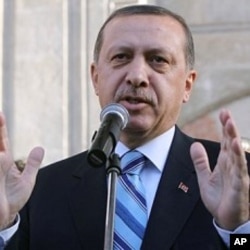Freedom of the press in Turkey the has come under international scrutiny, following the arrest and jailing of three journalists critical of the government. Human-rights groups claim more than 50 journalists are in jail for their reporting. The Turkish government argues it needs tight press control because it is facing the twin threats of terrorism and attempts to topple Turkish democracy.
Supporters cheered outside Istanbul court as three journalists were taken to jail Friday on charges of being members of a terrorist organization, and inciting public hatred. The three run the Oda TV news website that is strongly critical of Turkey's ruling AK party.
Turkish media reports say the arrests are in connection with the journalists' investigation into allegations police were fabricating evidence in trials of more than 400 people accused of seeking to overthrow the government.
Bilgi University Media Professor Haluk Sahin, also an executive of Turkey's TV-8 channel, says there is a government policy of media intimidation.
"Well I see this [as] another move in the direction of creating a pro-government press and by trying to muzzle up the rest of the press, which might occasionally publish [an] article or news stories critical of the government," said Sahin. "I see that as, an ominous sign in a move in [an] undemocratic direction. We have gone though similar stages in the past."
That concern is shared by the recently appointed U.S. ambassador to Turkey, Francis J. Ricciardone, who said after the arrests that in Turkey "there exists a stated policy of support for a free press. On the other hand, journalists are put under detention. We are trying to make sense of this."
That comment drew an angry response from senior Turkish government members, including Prime Minister Recep Tayyip Erdogan.
"He does not know Turkey, he does not have any idea what laws there are, and then he walks into a trap and makes a statement," he said. "First wait, research, ask what it is, and learn what the judiciary will do on this, what will be the outcome. [Not doing] this is called a ‘rookie’ ambassador, this is inexperience."
U.S. State Department spokesman P.J. Crowley stood firmly behind the ambassador, saying freedom of expression in Turkey remains a point of concern.
According to human-rights groups, there are 56 journalists in jail. Earlier this month the U.S.-based Committee to Protect Journalists accused Turkish authorities of parading journalists into court to suppress critical news and commentary.
Media freedom is also causing increasing concern in the European Union, which Turkey is seeking to join. European Parliament Committee on Turkey member Richard Howitt.
"The political will to continue to move Turkey towards a fully democratic free society, where there is not just a tolerance, but you welcome the fact that papers, radio stations criticize the government, sometimes in colorful and aggressive terms," he said. "That is not the position, let us be honest, today in Turkey - 50 writers in jail for non-violent writing and broadcasting. And many more police investigations or convictions in the pipeline and that can never be acceptable."
The government argues it has introduced legal reforms to improve media freedom and curtail the prosecution of writers and journalists.
Minister for EU Membership Ergemen Bagis dismissed EU criticism saying most of those jailed are imprisoned for non-journalist activities.
"We have already made a lot of changes, things are better today," said Bagis. "Only 11 of them have to do with political issues. The others are either terrorism related or attempts to topple democratic-elected governments."
Turkey's government says many jailed journalists have links to the Kurdish rebel group PKK, which has been fighting the Turkish state since 1984. But human-rights groups say Turkey's anti-terror laws are increasingly being used to curtail freedom of expression and opposition rather than to stop violence.





